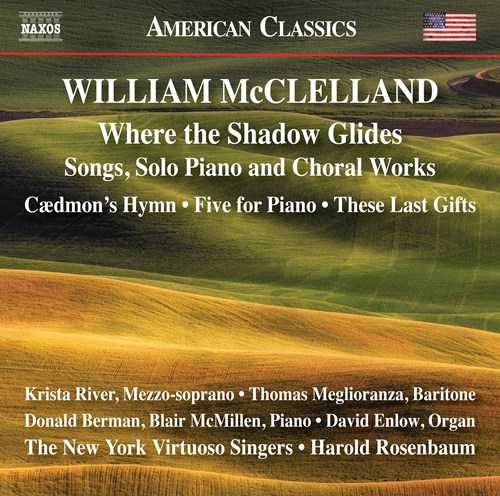William McClelland’s lyrical style shines brightest in vocal works

William McClelland: “Where the Shadow Glides.” Songs, choral music and piano works. New York Virtuoso Singers, Harold Rosenbaum, conductor. Krista River, mezzo-soprano; Thomas Meglioranza, baritone. Blair McMillen, Donald Berman, pianists; David Enlow, organist (Naxos).
American composer and pianist William McClelland has substantial experience with and grounding in this country’s vocal music, from the choral pieces of William Billings and 19th century folksongs through American musical theater.
That is the foundation for the strengths on a new Naxos recording, which brings together more than a dozen McClelland songs for vocal soloist and piano, along with some of his choral music and a short keyboard suite, Five For Piano. Most of the compositions date from the last 30 years, though there are two songs from the late 1980s and one from 1975.
The album opens with Caedmon’s Hymn, for chorus, accompanied by organist David Enlow. It’s the most recent piece—2018—and, at least on this album, the least representative of the composer’s work. The text here, as throughout, is cleanly set with the kind of judicious craft that follows the rhythms of the words and also makes it easy for the singers to articulate everything clearly. Harmonies are tonal and have the kind of smooth, logical motion that creates a light-feeling and satisfying inevitability. There are also features that feel less convincing within the overall aesthetic of the piece. The forceful but haphazard dissonances and a brief organ solo that suggests an uncontrolled desperation— just sound arbitrary and out of place.
If the hymn creates some contradictory pressures, the choral piece Hail Lovely and Pure and Five For Piano relieves them. The former sets a Medieval shepherd’s poem, and is both glowing and limpid. The piano pieces explore more of the sense of willfulness, of saying something strong in a solo voice—like the organ writing in Caedmon’s Hymn—but also with some of the dancing jauntiness of Henry Cowell’s most tuneful works.
Harold Rosenbaum leads the New York Virtuoso Singers in all the choral music, drawing singing that is lovely and fine in all the details. The excellent pianist Blair McMillen has full measure of the piano pieces, which he previously premiered.
Another excellent pianist, Donald Berman, accompanies mezzo-soprano Krista River and baritone Thomas Meglioranza as they alternate in the various songs. There is a welcome breadth of moods in McClelland’s songs from the aggressive absurdity of “The Defective Record” (from William Carlos Williams), to the haunting setting of James Wright’s “Snowstorm in the Midwest.” Singers and music really come together here, with the notes and rhythms lying right where the singers sound best, each syllable opening up their voices, which in turn articulate every word. River’s flowering voice on “Sea Rose,” from a poem by H.D., is a highlight, but all of these McClelland songs are a pleasure.